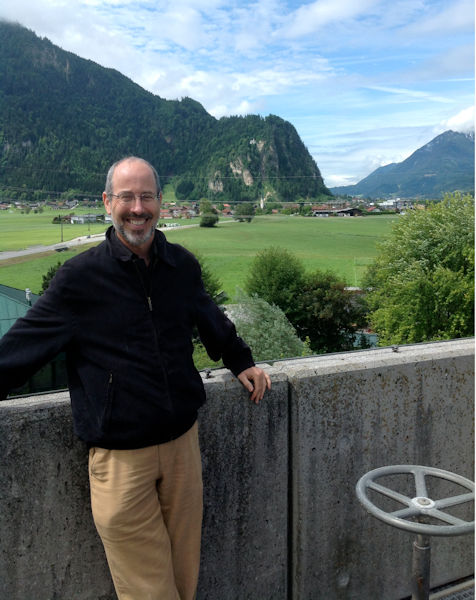
Ed McCormick, 2017 Water Environment Federation (WEF; Alexandria, Va.) Fellow, tours the Strass (Austria) Wastewater Treatment Plant, the first net-energy-positive facility in the world. McCormick led the development of an energy program that made the East Bay Municipal Utility District (EBMUD; Oakland, Calif.) the world’s second net-energy-positive facility. Photo courtesy of McCormick.
Six years ago, 2017 Water Environment Federation (WEF; Alexandria, Va.) Fellow Ed McCormick led the development and implementation of an energizing program for the water sector. The program cemented East Bay Municipal Utility District (EBMUD; Oakland, Calif.) as the first North American water resource recovery facility to be a net producer of renewable energy.
But according to McCormick, the 2014–2015 WEF president who has been a member of WEF since 1997 and of the California Water Environment Association since 1980, that is not his proudest achievement. As a wastewater facility manager with more than three decades of experience, McCormick has mentored several young professionals who today head water utilities and consulting firms.
“That is probably my greatest contribution to water, as the true job of a leader is to develop more leaders — not followers,” McCormick said.
An experienced leader in sanitation
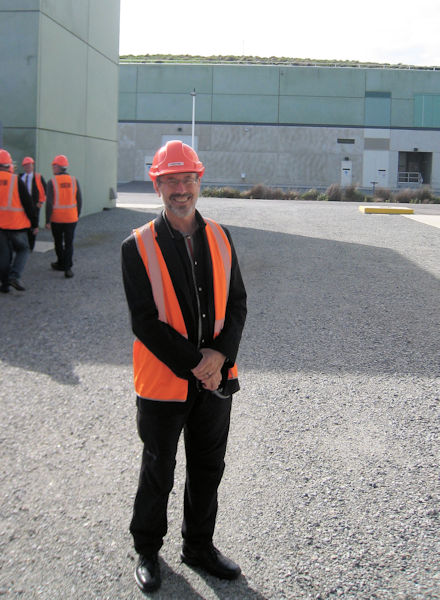
While representing WEF at the OzWater conference in 2016, Ed McCormick toured the Victoria Desalination Plant in Wonthaggi, Australia. Photo courtesy of Garry MacDonald.
McCormick served in various management roles at EBMUD beginning in 1983. He spearheaded transformational changes at the utility, collectively expanding EBMUD’s wastewater treatment capacity by 122%, negotiating the organization’s first major wastewater land acquisition in 60 years, and increasing on-site water recycling capabilities from 910 m3/d to 40,910 m3/d (0.2 mgd to 9 mgd). By the time McCormick departed from the organization in 2013, the Recycled Water Program had saved enough potable water to serve about 70,000 people, according to McCormick’s WEF Fellow application.
At EBMUD, and later as deputy general manager at Union Sanitary District (Union City, Calif.), McCormick oversaw the implementation of more than 320 capital projects totaling billions of dollars. This includes a $350 million wastewater capital program at EBMUD, the largest in the organization’s history, McCormick said.
In 2015, he founded McCormick Strategic Water Management LLC (Oakland, Calif.), a consulting service that provides water-sector leadership training, helps improve resource recovery, and assists with effective capital management.
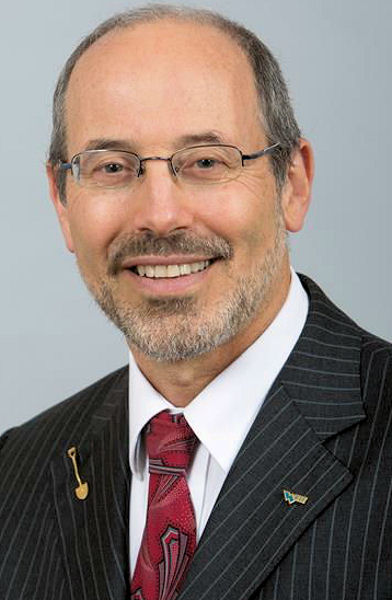
Ed McCormick, 2014–2015 WEF president, was announced as a WEF Fellow in 2017. WEF photo.
Advocating to advance the sector
McCormick has also been a leader of water sector professional organizations. He served on WEF’s Board of Directors for 7 years, becoming president in 2014. He helped launch the WEF Stormwater Institute, a hub for sustainable stormwater management. McCormick also facilitated partnerships with the U.S. Environmental Protection Agency, the National Association of Clean Water Administrators (Washington, D.C.), WateReuse (Alexandria, Va.), and The Water Research Foundation (WRF; Alexandria, Va.) to develop the Utility of the Future Today Recognition Program, which promotes resource recovery and sustainability at water and wastewater utilities.
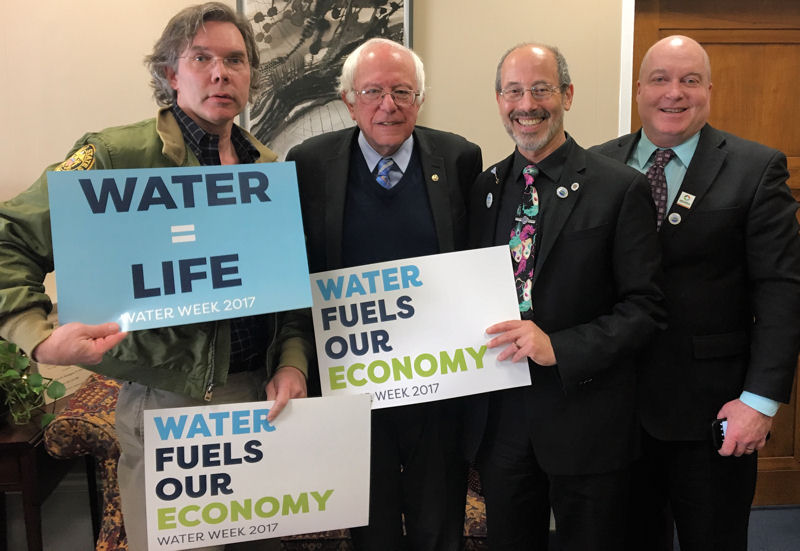
During the 2017 National Water Policy Fly-In & Expo, McCormick (third from left) joined other WEF leaders to discuss water priorities with U.S. Sen. Bernie Sanders (second from left). Photo courtesy of Katie Thomas, Sen. Sanders’ Policy Advisor for Energy and Environment, and Bob Fischer.
“Ed has a combination of strengths ranging from driving organizational and process improvements to advancing strategic vision,” said Matt Bond, 2011–2012 WEF president. “He has used all these strengths to move WEF from a competent water quality organization to one that embraces and equips the water resource recovery utilities of the future.”
McCormick also has served on the boards of both WRF and the Bay Area Clean Water Agencies (Oakland, Calif.), as well as in committee leadership positions at an array of other professional organizations.
Changing times, changing approaches
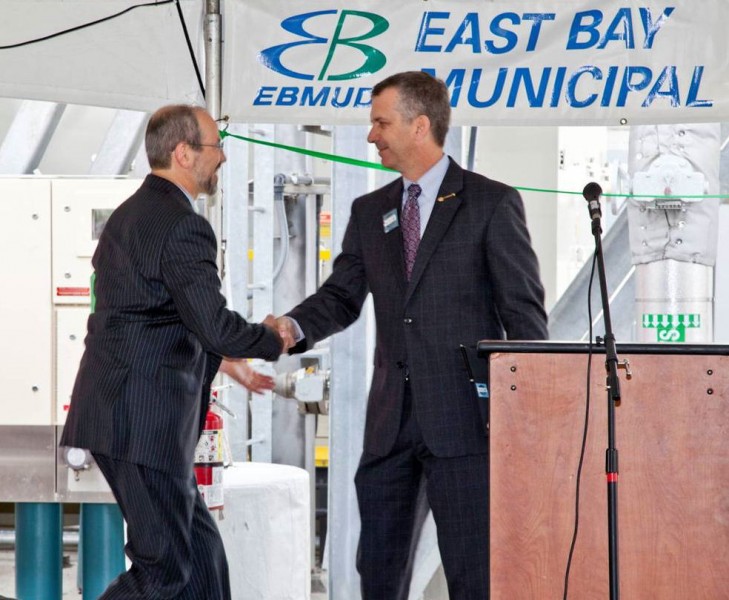
In 2012, Matt Bond (right), WEF past president, congratulates McCormick, then the EBMUD energy program manager, during event unveiling new technology that allowed the district to become an energy-producer. Photo courtesy of EBMUD.
During his career, McCormick has seen fundamental changes in the way water professionals approach their work. Wastewater treatment products historically considered “waste” now can serve useful purposes as fertilizers, biodegradable plastics, or renewable energy. What it takes to manage wastewater facilities effectively also has changed, McCormick said.
“Being a water leader today requires a broad skillset — the ability to inspire others and build effective relationships, create great team-based work environments, become a leader in your community, and understand how to effectively transform organizational culture. Technical prowess has become the easy part,” McCormick said.
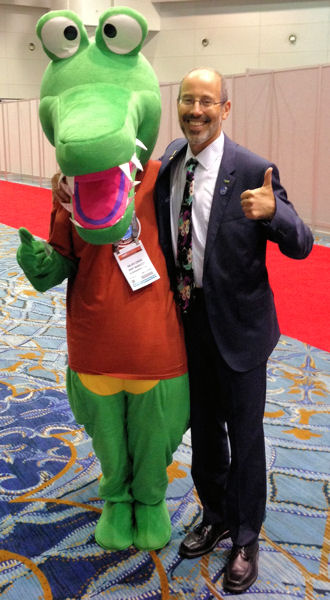
McCormick stands with WEF’s Niles the Crocodile during WEFTEC 2014. Photo courtesy of McCormick.
The incoming generation of water professionals will need skills beyond the technical if they are to find a solution to the impact of climate change, which is “the greatest environmental challenge of our time,” McCormick said. Young professionals should get involved in professional organizations as early in their careers as possible, and experienced professionals should mentor young people. One way to facilitate mentorship is to stay active in professional organizations even in retirement, he said.
McCormick’s final piece of advice: stay optimistic.
“Strive to work for people you trust who will support your growth and with people who inspire you,” he said. “Remember, the cup is always half-full — optimists tend to be both happier and more successful.”
— Justin Jacques, WEF Highlights
Follow WEF Fellows’ Stories in WEF HighlightsThe Water Environment Federation (WEF; Alexandria, Va.) Fellows program recognizes the professional achievements and contributions WEF members have made to the preservation and enhancement of the global water environment in practice areas served by the organization. In 2017, WEF bestowed this honor on 11 individuals. See a video featuring interviews of the 2017 WEF Fellows. Each of these recipients will be featured in future issues of WEF Highlights. Follow these stories with the keyword WEFFellows17. |








May 30, 2018
Featured